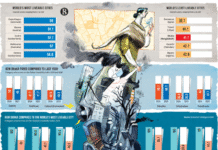When extraordinary courage meets unthinking response

It would appear from the relative calm on the streets and in universities that the student movement, which has catapulted an entire generation of teenagers into adulthood in just a matter of days, is over. But calm is not necessarily peace, and peace can be an exhausted possibility when wrong methods are applied to attain it. From the look of things, a metaphorical bullet in the form of a more threatening development may have been dodged, but a sense of relief can be short-lived as the manner in which the protests were stifled, and public outrage that had ignited them in the first place, may have inevitable consequences in the future.
At this point, it’s probably irrelevant to recall the particular circumstances under which the movement was born. Suffice to say, the deaths of the two college students on that fateful morning on July 29 gave the nation a rare moment of unity: they united in mourning for the two students killed, in seeking justice, seeking an end to road casualties, and supporting what started as a spontaneous gathering on Airport Road. That feeling of unity and rejuvenation is all but lost now. What transpired in the intervening period can be described as a classic case of what happens when, as a social commentator has put it, “extraordinary courage” is met with “extreme cowardice”—each day a more painful version of the previous day.
If the government is relieved that a movement that it could neither publicly disapprove of nor allow to continue unimpeded is finally over, those who supported it are just as well relieved that their children wouldn’t have to face the business end of violence any more, not at least in the foreseeable future.
This speaks of an institutional system increasingly alienated from the public that is unable or unwilling to meet their legitimate demands and would resort to aggressive methods to counter them. Note what the police had to say when asked why only students, and none of those behind the attacks, were implicated in the 29 cases filed over the violence in protests: “Does any officer has the guts to file a case against ruling party activists unless a political decision comes to that end?” (The Daily Star) There you have it—a crime is not a crime unless the system says so. A victim doesn’t deserve justice unless the system says he/she does. This culture of lawlessness, corruption and lack of accountability is precisely why a demand for justice by the grieving students of one school became a rallying cry for change for all the students and teachers from all educational institutions and people from all walks of life, who felt equally threatened by it and wanted a solution.
However, when extraordinary courage is met with extreme cowardice, it’s unlikely to go without consequences. The government’s handling of the movement, clearly one of the most injudicious crisis management blunders made by it in recent years, has drawn determined pushback. And some of the reactions or outcomes should worry it, with the general election only months away.
Firstly, the unflattering headlines in the international media, drawing attention to how the protesters were subjected to violence and torture, should worry it. The international media highlighted how the government allegedly crippled Internet services, censored local news coverage, and used extrajudicial force to cow the protesters into submission. Photos and video clips on these excesses circulated via social media attracted widespread condemnation from across the world. Not only did Bangladesh’s image suffer as a result of it, but the government too will have to wrestle with the fallout from such critical portrayals.
Secondly, the government should think about the potential role that the increasingly disaffected youth can play in the next election. It’s handling of the protests has clearly made it unpopular with a large section of the youth, aided by its past handling of popular movements like that for quota reforms, and further widened the chasm separating the institutional system from the people. For example, the young students particularly objected to the frequent references to the alleged politicisation of the movement and the involvement of “other forces”, which they viewed as an attempt to discredit their movement and support the heavy-handed response used to tackle it. The government has so far failed to come up with any credible evidence of the involvement of “other forces”, and made no visible attempt to identify the suspects either.
However, a fundamental problem with this line of thinking is that in Bangladesh, politics has a very narrow definition. Being political is generally understood to be supportive or critical of a political party. Going by this definition, you cannot be political and not directly support/oppose any party. This narrowing of definition, however, is as costly and chilling to the rich variety of the political traditions of this land as to those who like to think independently. Young people today are very conscious politically, but if we continue to go down this narrow path, all cherished notions of liberal democracy could soon be completely drowned out by reactionary politics.
According to the latest count, at least 1,21,34,000 new voters will exercise their franchise in the upcoming national election. These new voters may hugely impact the results of the election. Young people expect change and want to be heard, so the challenge for the government will be to try and convince them that it is sincerely willing to rectify its ways and be more receptive to their opinion and that of the general populace.
Badiuzzaman Bay is a member of the editorial team at The Daily Star.
Source: The Daily Star.









